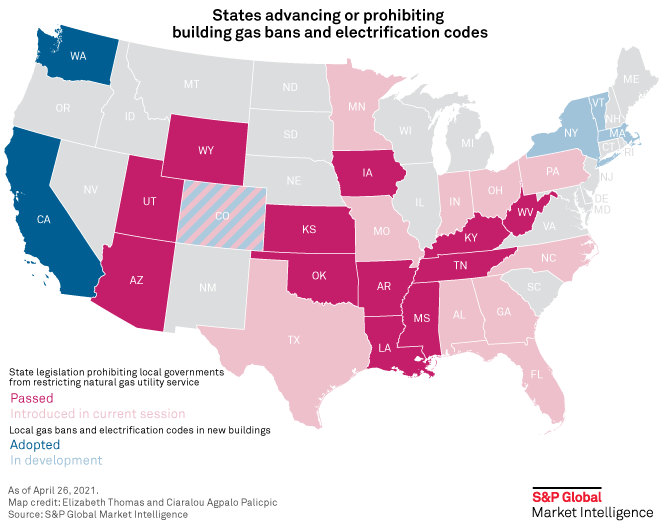S&P Global Offerings
Featured Topics
Featured Products
Events
S&P Global Offerings
Featured Topics
Featured Products
Events
S&P Global Offerings
Featured Topics
Featured Products
Events
Banking & Capital Markets
Economy & Finance
Energy Transition & Sustainability
Technology & Innovation
Podcasts & Newsletters
Banking & Capital Markets
Economy & Finance
Energy Transition & Sustainability
Technology & Innovation
Podcasts & Newsletters
S&P Global Offerings
Featured Topics
Featured Products
Events
1 Jun, 2021
Several current and former policymakers expressed skepticism that hydrogen and renewable natural gas are mature enough to play a major role in their states' transition from natural gas.
"I know that there's a lot of talk about fuels of the future like RNG and hydrogen," former New York State Public Service Commission Chair John Rhodes said. "My assessment of the evidence is that they are not ready for prime time. They may be ready in the future, and it's certainly a rational public stance to take that they deserve meaningful investment of the R&D type in order to make these solutions viable, or at least find out if they are."
Those fuels cannot be the justification, as they are often presented, for building more gas infrastructure, Rhodes said during a May 27 webinar hosted by the Institute for Policy Integrity, Columbia Law School's Sabin Center for Climate Change Law and the New York University School of Law's State Energy and Environmental Impact Center.

Rebecca Tepper, chief of the Energy and Environment Bureau at the Massachusetts attorney general's office, echoed that sentiment. She voiced concern that the gas industry is using RNG and hydrogen to "kick the can down the road" and expand infrastructure on the premise that the fuels will eventually decarboninze the grid. "I think that is a very damaging message, and I think it's wrong. I think we all need to be aware of it," Tepper said, highlighting recent media coverage of the fuels. "When it comes out, I think people need to speak out against that."
Tepper's office advocates for utility ratepayers and the environment. The Massachusetts attorney general's office successfully lobbied for state regulators to open a proceeding on long-term gas planning, similar to one opened in New York under Rhodes' chairmanship, which expired in February.
Washington State Utilities and Transportation Commission Chair David Danner said "the jury's still out" on whether hydrogen, RNG and carbon capture and storage can make meaningful contributions to reducing gas system emissions. As the commission studies how to reduce gas industry emissions to meet state carbon reduction targets, Danner said he will probe whether RNG supply is adequate and scrutinize the fuel's emissions profile. He said his current view is that supply is limited and "the carbon emissions potential is not as great as we need to meet our state goals."
Democratic Nevada Assemblywoman Lesley Cohen also shared concerns that her state would largely rely on importing RNG, that the fuel is too expensive and that "ecologically sound" supplies can only offset a small percentage of U.S. gas use. In the latest legislative session, Cohen introduced an integrated resource plan bill that would have forced gas utilities to evaluate new investments in fossil fuel infrastructure against alternatives like electrification and ensure future spending aligned with state carbon reduction goals. The bill did not pass.

These policymakers represent a largely liberal viewpoint and several hail from states where efforts to restrict gas use are well underway. However, RNG has also generated skepticism from more conservative regulators, including Idaho Public Utilities Commission President Paul Kjellander.
During a May 20 American Gas Association event, Kjellander said he believes it remains risky to allow utilities to invest ratepayer funds in RNG projects. Still, several states have followed Oregon's lead in advancing legislation that would allow distributors to invest a portion of rate base RNG procurement and project development.
Calls to advance electrification "justified"
In Rhodes' view, electrifying space and water heating and cooking presents a more practical, mature alternative for decarbonizing buildings in many parts of the country and for many building types.
Rhodes' said calls to march strongly towards electrification are "justified." Policymakers can begin by implementing rebates, subsidizing financing and organizing markets to boost uptake of technology like electric heat pumps, he added. They should also begin using building codes to phase out gas use and minimize any future fossil fuel infrastructure, he said.
Danner said a mix of incentives and legal requirements, including building codes, is "probably the best way to go." But he noted that banning gas use by a certain date presents complications, including stranded costs tied to billions of dollars of infrastructure, job displacement and challenges to depreciating assets.
Electrification would also require renewable power and electric transmission investment at a time when the Pacific Northwest is experiencing resource adequacy challenges as fossil fuel generation comes offline, climate change is stressing hydropower resources and wildfires are disrupting the grid with increasing regularity, Danner said.
Still, Danner said states should review policies that promote gas use or effectively advantage gas over other fuels. Laws that say all citizens are entitled to natural gas service went into effect before carbon pollution was seen as a pressing issue, he said. States should reconsider service extensions policies that impose costs on existing gas customers to subsidize connections to new customers, he added.
Cohen also raised concerns about ratepayers financing those build-outs. A Nevada law promotes the expansion of gas infrastructure to new communities to support economic development.
Danner and Rhodes raised the prospect of electric and multi-utilities shouldering some of the costs of the transition, since electrification will benefit them in the long term. Rhodes also said he preferred financing through progressive taxes rather than utility rates, saying the latter unduly tax the most vulnerable citizens. However, Cohen and Danner noted their states have relatively regressive tax policies.
